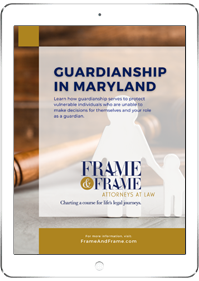There are many reasons why a guardianship is an excellent solution when life’s problems become overwhelming. Sometimes it becomes necessary to put into place legal protection of a man, woman, or child. An adult may become incapacitated temporarily, such as after an accident, and may need someone to handle his or her affairs until recovered. Another person may suffer permanently from an illness or psychological disorder that renders the individual incapable of managing his or her own affairs. In other instances, a parent may not be able to care for a child due to illness, drug abuse, incarceration, or severe financial problems. In such situations, a guardianship may need to be established.
Courts are tasked with establishing guardianships. A guardianship is different from a durable power of attorney. Some people believe that if they have a Healthcare Power of Attorney or Medical Directive, they don’t need a guardianship for someone who is temporarily incapacitated. Unfortunately, this is not the case. A guardianship may be necessary for someone who is temporarily incapacitated by allowing bills to be paid and excessive liabilities to be managed for the good of the protected person or ward, contact our experienced Maryland guardianship attorneys today.
Filing for a Guardianship without a Lawyer
Individuals may petition a court for legal guardianship. But the laws are different between states, including the rights of grandparents. So, it is a good idea to consult with an attorney before filing a petition with your local court. To get started on a guardianship, call us at 410-255-0373.
Reversing a Guardianship is Possible
A guardianship can be reversed by a court if the alleged disabled person or minor, a concerned third party, or the appointed guardian wishes to request that the appointment be reversed. The person wishing to obtain a guardianship should approach a family court in the jurisdiction of the alleged disabled person or minor with a petition for guardianship. One of our attorneys can help you with this.
Our Maryland Attorneys Explain Guardianships
In adult guardianships, the person is referred to as an alleged disabled person. In situations involving the guardianship of a minor, the protected person is called the minor. Guardianship is a legal arrangement that places someone under the supervision of a custodian, also known as a guardian. Many guardianships are temporary arrangements, while others are permanent. A guardian may be required to report annually to the court his or her activities on behalf of the protected person or ward. The idea of guardianship has evolved to include facilitating the independence and self-reliance, so dignity and quality of life can be ensured to the extent possible.
There are Two Types of Guardianships
Guardianship of a person grants authority over life issues that affect the well-being of an individual. Such authority typically includes the follow responsibilities:
- Making medical decisions,
- Providing consent to and supervising medical treatment,
- Consenting to and supervising education, psychiatric treatments, and behavioral counseling,
- Maintaining a residence or determining an alternative residence,
- Making end-of-life decisions, and
- Maintaining the autonomy of the protected person or ward.
Guardianship of an estate or property, which is also known as conservatorship. This empowers the guardian or conservator to make financial decisions of a protected person. Such authority typically includes the following responsibilities:
- Gathering, organizing and protecting assets,
- Safeguarding property from loss and damage,
- Paying bills for the maintenance of assets,
- Managing income from assets,
- Arranging appraisals of assets, and
- Obtaining court approval to sales of assets.
Guardianships of Minors
Guardianship of a minor may be used to protect the legal rights of a minor. When a parent is not able to act on behalf of a minor child, usually a relative is appointed as guardian. A parent may remain financially responsible for a minor with a guardianship and may not be required to forfeit parental rights. Situations in which a guardian of a minor is in place may still require parental approval prior to any legal proceeding.
Qualifications and Role of a Guardian
To qualify as a guardian, a person must be at least 18 years of age, cannot have a felony or gross misdemeanor record indicating dishonesty, and may not be a protected person or incapacitated. Typically, courts will select a guardian based on the wishes of the alleged disabled person. Guardians are expected to help, not control, the lives of the alleged disabled person or minor. Guardians are there to make decisions and give consent, rather than govern the lives of those they serve.
The Difference between Custody and Guardianship
A guardian, rather than a parent, has physical custody of a minor. Biological parents maintain their parental rights, even when they don’t have physical custody. A short-term guardianship can be created. Both parents must sign and notarize the temporary guardianship agreement. If one parent is deceased, missing, or lost his or her parental rights, the surviving parent can be the only signatory.
Our Maryland Guardianship Attorneys Will Help You Take Care of Someone Else
Discussing guardianship may be uncomfortable. Fortunately, concerns and problems can be addressed in ways that give security and peace of mind for your future and the future of those you love. At Frame & Frame, our skilled, knowledgeable Maryland guardianship attorneys can help you deal with the present and prepare for your future care with the right set of tools and legal instruments. Call our offices in Pasadena (410-255-0373) or Stevensville (410-643-2202) to start the conversation. Or, contact us online to get started.
Frequently Asked Questions About Guardianship
Guardianship is a legal proceeding where the petitioner asks the court to find that an individual is unable to manage their financial and health care affairs due to a disease or other debilitating condition and appoint them to make decisions affecting the disabled person’s property, person, or both.
A guardian may be appointed by the court upon petition by an interested person. Interested persons include the spouse and heirs of a person with a disability, any governmental agency paying benefits to the person, or any person or agency eligible to serve as guardian.
A guardian of the person makes decisions about a person’s medical care, housing, food, clothing, and other subjects that affect the person. In contrast, a guardian of the property typically makes decisions about a person’s money, income, property of any kind, stocks and bonds, and other financial matters.
To become a guardian of a disabled adult, the interested person will file a petition and certificates of disability completed by a doctor, among other documents, to the circuit court in the county where the disabled person resides.
To become guardian of a minor, the interested person will submit a petition to the orphans’ court in the county where the minor resides.
All guardians are fiduciaries, which means they have been given a legal relationship of authority for the person or property of another. They have a duty to be loyal to the person they are a fiduciary for and to act with care when making decisions. A guardian has a yearly reporting requirement to the Court. In general the guardian will manage the disabled persons property and/or provide for their health, wellness, and safety.
If the disability which qualified a person to require a guardian no longer exists, the guardian is required to ask the court to terminate the guardianship. An individual who is under guardianship, but does not believe that they should be can also petition the court to terminate the guardianship. All guardianships terminate upon the death of the disabled person. A guardian can be removed from their position for various reasons, all which indicate that they have broken their fiduciary duty to the disabled person or minor.
We have a blog on this already https://frameandframe.com/the-
In many ways, they are the same and have similar responsibilities and duties to a disabled person. The major difference is guardianship is a relationship created and overseen by the by the court. Attorneys, in fact, pursuant to a power of attorney do not have yearly reporting requirements to the court and a properly executed power of attorney can avoid the need for guardianship.
All guardianship matters require a trial whether they are contested or not. Contested guardianship matters often include substantially more evidence and testimony than those that are uncontested. Because guardianship has a significant effect as to the disabled persons, rights and freedoms, a higher level of scrutiny is applied by the court when contested.
Contact Our Experienced
Maryland Guardianship Attorneys
With four offices in Maryland, our guardianship law attorneys can help address your concerns. A member of our firm can meet with you to review your options and best ways to proceed with your case.





